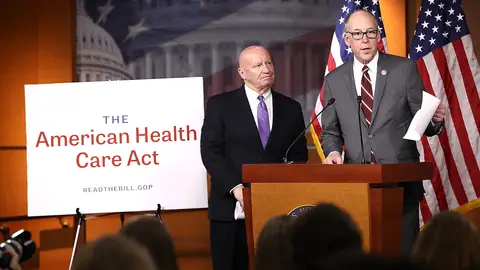New Report Reveals 14 Million Would Be Uninsured by 2018 and 24 Million by 2024 Under GOP Health Care Plan

In a new report published by the non-partisan Congressional Budget Office, the problems with the American Health Care Act would result in 14 million uninsured people by the year 2018. If the plan were to continue until 2026, we would see 24 million people without health coverage.
According to the CBO report, the GOP would fulfill one of their goals of lowering the deficit as well as premiums. The proposed health care plan would potentially lower the national deficit by $337 billion between 2017 and 2026. The cost of premiums would rise until 2020, then after the removal of the individual mandate, consumers would see about 10 percent drop in the premiums they had under Obamacare.
Although the report presents a straightforward evaluation not rooted in politics, several GOP supporters of the plan have criticized the report.
Health and Human Services Secretary Tom Price rejected the report and said the projections of uninsured people are “virtually impossible” and said he believes the AHCA will insure more people than Obamacare.
“We disagree strenuously with the report,” said Price.
CBO Director Keith Hall was happily appointed by several GOP lawmakers including Paul Ryan and Mitch McConnell.
Although GOP members may have presumed this bill as a slam dunk for Republicans, the CBO did its job in pointing out the factual faults with the health care plan.
Former speaker Newt Gingrich criticized the report and the CBO during an appearance on Fox News.
“They should abolish the Congressional Budget Office. It is corrupt. It is dishonest. It was totally wrong on ObamaCare by huge, huge margins," Gingrich said to Fox's Martha MacCallum. "I don't trust a single word they have published, and I don't believe them."
However, House Speaker Paul Ryan found the CBO report to be a pleasing affirmation of the bill.
“This report confirms that the American Health Care Act will lower premiums and improve access to quality, affordable care,” Ryan said in a statement.
The speaker chose to focus on the minor findings in the report that state premium costs will eventually lower (but only after they become more expensive).





